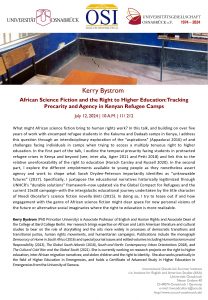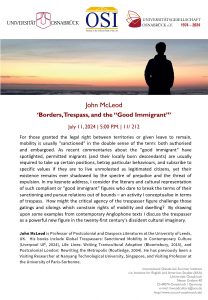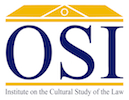Nov
18
2025
OSI
Since 2009, the OSI has been fostering interdisciplinary study at the intersection of law and culture. Our goal has always been to encourage critical dialogue and scholarly exchange between legal studies and the humanities. In today’s challenging global context, this mission feels more urgent than ever and we are committed to build on and continue our efforts, especially in the face of the current challenges to democratic and open societies.
From July 18–26, 2026, the Institute will once again offer a rich program combining thematic workshops, small-group seminars, and a concluding conference for up to twenty international participants, including doctoral, post-doctoral, and advanced M.A. scholars. The introductory workshop will explore the scope and potential of interdisciplinary approaches in law and the humanities. Subsequent sessions and seminars will tackle key issues in contemporary cultural legal studies, engaging with questions of rights, legal subjecthood, citizenship, migration and more.
The OSI’s central aim is to promote scholarly exchange across disciplines and to provide a forum for the critical discussion of both ongoing research and emerging ideas. Participants will have the opportunity to present their own work, receive feedback from OSI faculty, and engage in in-depth discussion in both larger and smaller group settings. The program will culminate in a two-day conference featuring invited speakers and panel sessions, highlighting the most pressing debates in law and culture today.
The OSI 2026 promises an intensive, thought-provoking, and collaborative environment—a space for new ideas, rigorous discussion, and meaningful interdisciplinary engagement. We look forward to welcoming the next generation of scholars to this landmark 10th edition of the Institute.
Jul
11
2024
OSI
 We are proud to announce that Kerry Bystrom will be joining our conference this year and hold a keynote on the topic “African Science Fiction and the Right to Higher Education: Tracking Precarity and Agency in Kenyan Refugee Camps”!
We are proud to announce that Kerry Bystrom will be joining our conference this year and hold a keynote on the topic “African Science Fiction and the Right to Higher Education: Tracking Precarity and Agency in Kenyan Refugee Camps”!
Kerry is Associate Professor of English and Human Rights and Associate Dean of the College at Bard College Berlin. Her research brings expertise on African and Latin American literature and cultural studies to bear on the role of storytelling and the arts more widely in processes of democratic transitions and transitional justice, human rights movements, and humanitarian campaigns. Publications include the monograph Democracy at Home in South Africa (2016) and special journal issues and edited volumes including Humanitarianism and Responsibility (2013), The Global South Atlantic (2018), South and North: Contemporary Urban Orientations (2018), and The Cultural Cold War and the Global South (2021). She is currently working on research projects on the right to higher education; inter-African migration narratives; and stolen children and the right to identity. She also works practically in the field of Higher Education in Emergencies, and holds a Certificate of Advanced Study in Higher Education in Emergencies from the University of Geneva.

Jul
11
2024
OSI
 We are so excited to announce the opening keynote of our symposium held by John McLeod!
We are so excited to announce the opening keynote of our symposium held by John McLeod!
John McLeod is Professor of Postcolonial and Diaspora Literatures at the University of Leeds, UK. His books include Global Trespassers: Sanctioned Mobility in Contemporary Culture (Liverpool UP, 2024), Life Lines: Writing Transcultural Adoption (Bloomsbury, 2015), and Postcolonial London: Rewriting the Metropolis (Routledge, 2004). He has previously been a Visiting Researcher at Nanyang Technological University, Singapore, and Visiting Professor at the University of Paris-Sorbonne.
He will hold a lecture on the topic of “Borders, Trespass, and the ‘Good Immigrant'”.

Jul
04
2024
OSI
 We would also like to also introduce Laura A. Zander as a member of the OSI 2024 faculty! Laura is a Postdoctoral Research Fellow at Osnabrück University and was part of the Collaborative Research Centre (SFB 1385) “Law and Literature” at the University of Muenster (WWU), funded by the German Research Foundation (DFG), where her research focused on Literature as Equity in British Cultural History most specifically on legal fictions and the works of Wilkie Collins, Elizabeth Gaskell and the Brontës. Her current research at the University of Osnabrück on Subjects on the Move in Literature and Human Rights is closely connected to this year’s OSI and in collaboration with the law school at the WWU Muenster. Laura will convene the workshop on interdisciplinarity along with Leila Neti and Peter Schneck.
We would also like to also introduce Laura A. Zander as a member of the OSI 2024 faculty! Laura is a Postdoctoral Research Fellow at Osnabrück University and was part of the Collaborative Research Centre (SFB 1385) “Law and Literature” at the University of Muenster (WWU), funded by the German Research Foundation (DFG), where her research focused on Literature as Equity in British Cultural History most specifically on legal fictions and the works of Wilkie Collins, Elizabeth Gaskell and the Brontës. Her current research at the University of Osnabrück on Subjects on the Move in Literature and Human Rights is closely connected to this year’s OSI and in collaboration with the law school at the WWU Muenster. Laura will convene the workshop on interdisciplinarity along with Leila Neti and Peter Schneck.
Laura holds an M.A. in English Literature and Linguistics and both state examinations in Law after completing her postgraduate judicial service traineeship. After receiving her PhD by the faculty of language and literatures at the University of Munich (LMU) she worked as a lecturer in the English Department. She also worked as a research assistant and taught at the Faculty of Law at the Universities of Munich, Frankfurt and Saarbruecken, for a master’s program in Digital Forensics. Publications include Writing Back / Reading Forward: Reconsidering the Postcolonial Approach (Berlin 2019), as well as articles on law and literature, gender and postcolonial studies, and both South African and Caribbean literature
Jul
03
2024
OSI
Our concluding workshop will be held by Leti Volpp and Marco Wan on the topic of Mobility and Rights.
Our first session approaches mobility as a key issue in the study of law and the humanities. What happens when legal texts, concepts, and/or persons move into new cultural contexts? We will consider familiar questions such as translation, narrative, and interpretation in a global frame. Students will be encouraged to reflect upon how questions of mobility might structure their own research.
Our second session will focus on the mobility of persons in relation to rights. We will consider the concept of the “right to have rights” as articulated by Hannah Arendt in 1951 in relation to the importance of belonging to an organized political community. We will discuss how “the right to have rights” been taken up in relation to migration and to citizenship, the importance of territorial presence in claims making by immigrants, and the role of rights discourse in migrant struggles.






